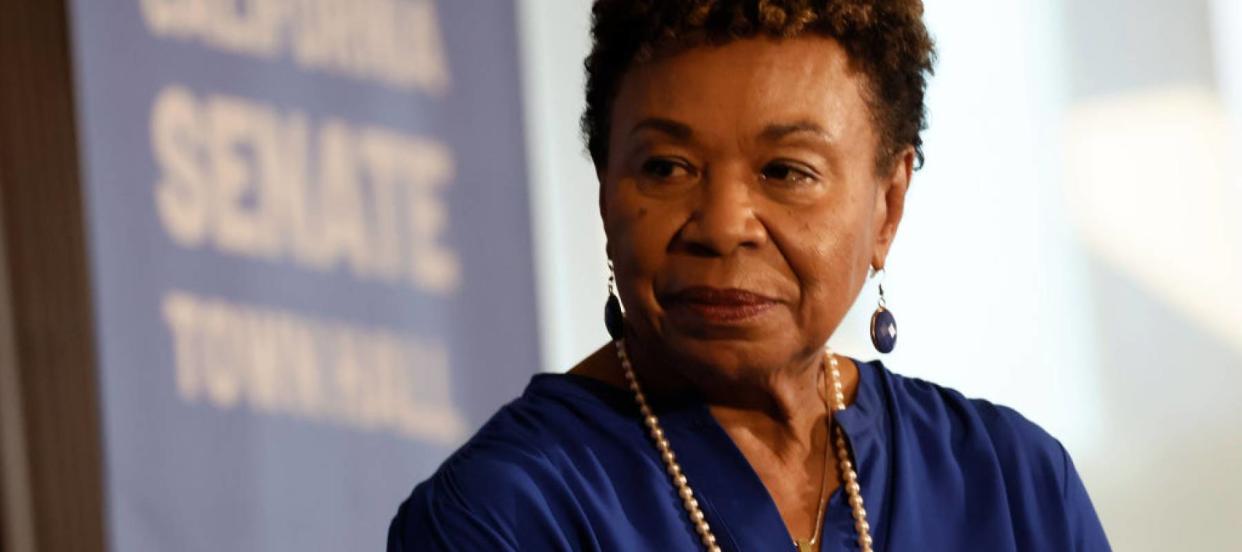'Do the math': Democrat Rep. Barbara Lee just lost the California Senate primary — did her push for a $50/hour minimum wage cost her votes?

Democratic Rep. Barbara Lee has been eliminated from the running in the California Senate primary this week, losing the historic Senate race to fill the seat occupied by Dianne Feinstein for more than 30 years.
Republican Steve Garvey and Democratic Rep. Adam Schiff advanced and will face off in the California Senate General Election in November.
Lee was known for her unflinching ideas on domestic policy — some of which were controversial.
Last month, Lee made headlines when she said she wanted to see the federal minimum wage hiked up to $50 an hour. This would amount to $104,000 per year of income.
Don't miss
Commercial real estate has beaten the stock market for 25 years — but only the super rich could buy in. Here's how even ordinary investors can become the landlord of Walmart, Whole Foods or Kroger
Cost-of-living in America is still out of control — use these 3 'real assets' to protect your wealth today, no matter what the US Fed does or says
Anything can happen in 2024. Try these 5 easy money hacks to help you make and save thousands of dollars in the new year (they will only take seconds)
That is almost seven times the federal minimum wage of $7.25 per hour and more than three times the California minimum wage of $16 per hour.
“I know what worker productivity means,” Lee said during the U.S. Senate debate on Feb. 12. “That means you have to make sure that your employees are taken care of and have a living wage.”
“Just do the math,” she continued. “We have national minimum wages that we need to raise to a living wage.”
Did this controversial policy hamper her chances of winning — and was it a realistic goal?
Crunching the numbers
However, even Lee's fellow Democrats opted to back a more modest proposal of $20 or $25.
Lee had originally cited a United Way report which found that a family of four living in the San Francisco Bay Area would need $127,000 a year just “to get by.” (Moneywise also found a 2022 United Way Bay Area report that cited a family of four would need $109,088 to meet basic needs.)
A $50 minimum wage would result in a total income of around $104,000 over the course of a year — and believe it or not, that still doesn’t meet the median income in certain parts of the Golden State.
Lee cited 2023 data from the California Department of Housing and Community Development which found that people who make $104,000 per year and live alone in San Francisco, San Mateo or Marin counties, were considered low income households in 2023.
In the same three counties, a one-person household making $65,250 was considered very low income, those making $39,150 were considered extremely low and people making $18,400 per year were acutely low income.
The senate candidate balked at how a six-figure income is “barely enough to get by” in certain parts of California and she blamed it on “the affordability crisis.”
San Francisco, San Mateo and Marin all rank in the top 10 most expensive counties to buy a house in the US, according to the Zillow Home Value Index.
Rental costs are also sky-high in those areas. According to Zillow, the typical monthly asking rent in the San Francisco metro area is $3,295, which is 65% higher than the national median. To comfortably afford that — without spending more than 30% of your income on housing — a person or household would need to bring in around $10,983 per month, or $131,796 per year.
When justifying her proposed $50 minimum wage, Lee said: “I have got to be focused on what California needs and what the affordability factor is when we calculate this wage.”
Read more: Generating 'passive income' through real estate is the biggest myth in investing — but here's 1 surefire way to do it with as little as $10
The minimum wage debate
Not all of the candidates who had been vying for California’s open Senate seat — to replace the late Dianne Feinstein — agreed that such a dramatic minimum wage increase was needed.
In fact, Steve Garvey (R) — a former MLB star for the Los Angeles Dodgers and the San Diego Padres — argued the “minimum wage is where it is and should be.”
He brought up the state’s contentious new fast-food law (AB 1228) — signed into law by Gov. Gavin Newsom on Sept. 28, 2023 — that will hike fast food workers’ wages up to $20 an hour, starting April 1, 2024. That is $4 higher than the Golden State’s current minimum wage of $16.
“That’s going to increase costs for hard-working Californians to go to a franchise,” Garvey argued. “Instead of a Big Mac for $9, it’s going to be $15.”
Rep. Adam Smith (D) clapped back: “You want to know why people are living on the street? It’s because we’re paying them poverty wages. Try to find a house anywhere in California when you’re earning minimum wage.”
He added, “We have to raise people’s incomes, we have to build a lot more affordable housing and ground services for people who are homeless. We can do this, we’ve demonstrated an approach that works.”
What to read next
Rich young Americans have lost confidence in the stock market — and are betting on these 3 assets instead. Get in now for strong long-term tailwinds
Don't let high car insurance rates drain your bank account — find how you can pay as little as $29 a month
Millions of Americans are in massive debt in the face of rising costs. Here's how to get your head above water ASAP
This article provides information only and should not be construed as advice. It is provided without warranty of any kind.
